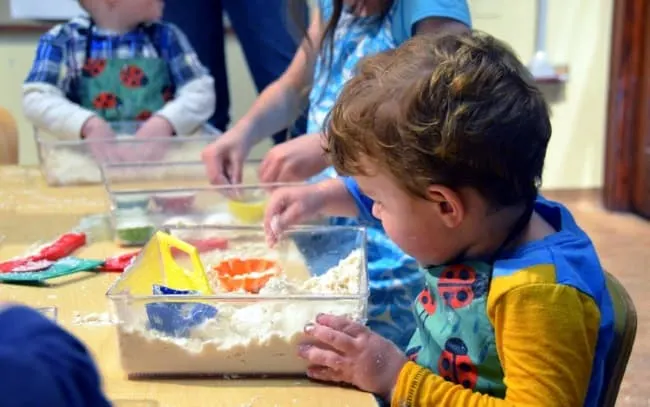
Play is one of the most important aspects of a child’s growth. It contributes to healthy development in all aspects of their health, including physical, cognitive, emotional, and social.
Young children develop at a rapid rate and they are constantly taking in new information from their surroundings. Parents can support their child’s growth and development by providing a safe and exciting environment for them to explore in confidence.
As children explore their surroundings, they interact with objects and people through the five senses. New stimuli help to develop their touch, taste, sight, smell, and hearing. Sensory toys can be a great way to encourage sensory and explorative play in children to strengthen these senses.
Playing with sensory toys during the early years can help children when they reach higher levels of education. Explorative play can accelerate the development of the brain and skeletal muscles, which enhances cognition and physical health.
What Is Sensory Play and What Are Sensory Toys?
Sensory play involves stimulating a child’s five senses. Parents often buy their children a range of sensory toys to aid their child’s development and help them to make sense of the world around them.
Sensory toys cover a wide variety of different objects and games that have lots of different parts. These toys are designed in such a way that they promote the exploration of the senses.
Most sensory toys stimulate just one or two of the five senses. This avoids your child from getting overwhelmed with too many different stimuli at once. Some toys focus on stimulating just one of the senses.
The different kinds of sensory toys include:
- Touch – sensory toys that are focused on enhancing the sense of touch have lots of different materials, textures, and surfaces. Examples include soft magnetic letters and numbers, fluffy cotton, bumpy puzzle pieces.
- Taste – some sensory toys are safe to be placed in between the teeth or in the mouth. For example, chewing rings and dummies are taste-focused sensory toys.
- Sight – sensory toys that have flashing lights and lots of different colors are used to stimulate and develop vision in children.
- Smell – some toys emit different scents and aromas to stimulate children’s olfactory receptors and develop their sense of smell.
Hearing – sensory toys that emit noises, such as whistles, bells, horns, squeaky balls, and xylophones, are designed to promote the development of a child’s sense of hearing.
Another great sensory toy for children is kendama. It’s a fun game for kids and adults, which consists of a handle, a pair of cups, and a ball.
How Do Sensory Toys Help a Child’s Development?
Sensory toys provide lots of benefits for young children when it comes to healthy growth in all aspects of life. Whether it’s the development of fine motor skills, the promotion of cognitive development, or the improvement in social skills, sensory toys do it all!
Let’s take a look at the benefits of sensory toys.
Improved Cognitive Development
Sensory toys encourage your child to explore their surroundings, which exposes them to brand-new stimuli. This strengthens all five of the senses and promotes the development of new neural connections in the brain. These connections are essential to accelerated brain development.
Increased Physical Development and Coordination
Children who play with lots of sensory toys are more likely to develop gross and fine motor skills at a young age. This is because many sensory toys have parts that children can fiddle, grip, and play with.
Children are also more likely to have better coordination and balance if they play with sensory toys as they might need to walk, run, or skip with them.
Better Social Skills
Any form of play that involves interaction with others their age will promote healthy social development in a young child.
Sensory toys can be shared and played within small groups, which can encourage children to play with others in nursery or at school. This can enhance their self-esteem and confidence from a young age.
Sensory play with other children can also help youngsters to learn how to interpret other people’s emotions as well as show them the importance of sharing with those around them.
Improved Concentration and Focus
Sensory toys can keep children engaged for hours. They can develop a stronger sense of awareness by learning to react to different stimuli.
Playing with sensory toys, regardless of the senses that they stimulate, promotes alertness, focus, and concentration in youngsters. This can translate into better performance at school when children reach school age.
- Sagittarius Man & Gemini Woman Love and Sex Compatibility - January 31, 2024
- Taurus Ascendant Rising Personality Traits in Men (Guide) - January 31, 2024
- How to Seduce and Attract a Sagittarius Man (Seduction Tips) - January 31, 2024
